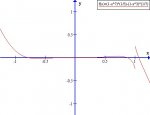You are using an out of date browser. It may not display this or other websites correctly.
You should upgrade or use an alternative browser.
You should upgrade or use an alternative browser.
integral from 0 to 1: (1 - x^7)^(1/3)...
- Thread starter dts5044
- Start date
I got to looking at your problem and noticed it looks like we can use the Beta function.
\(\displaystyle B(p,q)=\int_{0}^{1}x^{p-1}(1-x)^{q-1}dx=\frac{\Gamma(p)\Gamma(q)}{\Gamma(p+q)}\)
We have to use a little substitution to hammer into shape.
For the first one:
\(\displaystyle \int_{0}^{1}(1-x^{7})^{\frac{1}{3}}dx\)
Let \(\displaystyle u=x^{7}, \;\ u^{\frac{1}{7}}=x, \;\ \frac{1}{7}u^{\frac{-6}{7}}du=dx\)
\(\displaystyle \frac{1}{7}\int_{0}^{1}u^{\frac{-6}{7}}(1-u)^{\frac{1}{3}}du\)
Now, we have \(\displaystyle p-1=\frac{-6}{7}, \;\ p=\frac{1}{7}\)
\(\displaystyle q-1=\frac{1}{3}, \;\ q=\frac{4}{3}\)
Now, sub into our gamma functions:
\(\displaystyle \boxed{\frac{1}{7}\cdot\frac{\Gamma(\frac{1}{7})\cdot\Gamma(\frac{4}{3})}{\Gamma(\frac{1}{7}+\frac{4}{3})}=.943132664565}\)
If you use the same technique on the other one, you find the same exact answer. Subtracting them yields 0.
\(\displaystyle B(p,q)=\int_{0}^{1}x^{p-1}(1-x)^{q-1}dx=\frac{\Gamma(p)\Gamma(q)}{\Gamma(p+q)}\)
We have to use a little substitution to hammer into shape.
For the first one:
\(\displaystyle \int_{0}^{1}(1-x^{7})^{\frac{1}{3}}dx\)
Let \(\displaystyle u=x^{7}, \;\ u^{\frac{1}{7}}=x, \;\ \frac{1}{7}u^{\frac{-6}{7}}du=dx\)
\(\displaystyle \frac{1}{7}\int_{0}^{1}u^{\frac{-6}{7}}(1-u)^{\frac{1}{3}}du\)
Now, we have \(\displaystyle p-1=\frac{-6}{7}, \;\ p=\frac{1}{7}\)
\(\displaystyle q-1=\frac{1}{3}, \;\ q=\frac{4}{3}\)
Now, sub into our gamma functions:
\(\displaystyle \boxed{\frac{1}{7}\cdot\frac{\Gamma(\frac{1}{7})\cdot\Gamma(\frac{4}{3})}{\Gamma(\frac{1}{7}+\frac{4}{3})}=.943132664565}\)
If you use the same technique on the other one, you find the same exact answer. Subtracting them yields 0.
Dr. Flim-Flam
Junior Member
- Joined
- Oct 10, 2007
- Messages
- 108
Find the power series for (1-x^7)^(1/3). Use binomial series.
[1-x^7]^(1/3) = 1-x^7/3-x^14/9-5x^21/81-10x^28/243-22x^35/729-154x^42/6561+...+
Integral[1-x^7]^(1/3),x,0,1 = x-x^8/24-x^15/135-5x^22/1782-10x^29/2047-22x^36/26244-154x^43/282123-...,x,0,1
+1-1/24-1/135-5/1782-10/7047-22/26244-154/282123 = about .94531 which with only 7 terms the value is only off .00218. Good enough for government work.
[1-x^7]^(1/3) = 1-x^7/3-x^14/9-5x^21/81-10x^28/243-22x^35/729-154x^42/6561+...+
Integral[1-x^7]^(1/3),x,0,1 = x-x^8/24-x^15/135-5x^22/1782-10x^29/2047-22x^36/26244-154x^43/282123-...,x,0,1
+1-1/24-1/135-5/1782-10/7047-22/26244-154/282123 = about .94531 which with only 7 terms the value is only off .00218. Good enough for government work.

